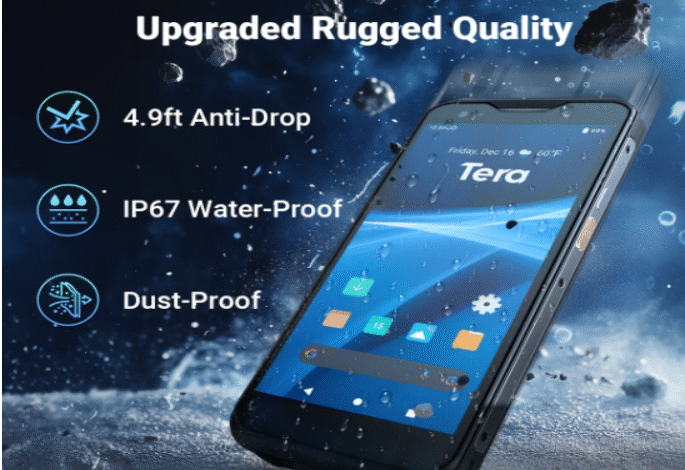How Android Barcode Scanners Revolutionize Logistics Efficiency

In today’s fast-paced supply chains, the demand for speed and accuracy is constant. Warehouses and logistics centers are the hubs of this activity, where any inefficiency can cause significant delays and costs. Manual processes, prone to human error, are no longer sufficient to meet modern demands. Android barcode scanners have emerged as a transformative technology, offering a powerful solution for optimizing logistics operations from end to end.
These devices do more than just read barcodes; they are pivotal in creating a more connected, accurate, and efficient supply chain. By automating data capture and providing real-time insights, they empower businesses to enhance productivity, reduce errors, and gain a competitive edge in a demanding market.
Core Benefits in Logistics Operations
The adoption of android barcode scanners brings immediate and substantial improvements to various aspects of warehouse and logistics management. These benefits directly address the core challenges of inventory control, order fulfillment, and data accuracy.
See also: How Home Builders Customize Floor Plans for Unique Needs
Real-Time Inventory Tracking
One of the most significant impacts of Android barcode scanners is the shift to real-time inventory management. Traditional methods involving manual counts and data entry are slow and often lead to discrepancies. With barcode scanners, every item movement is captured with a simple scan, instantly updating the central inventory system.
This immediate visibility into stock levels is crucial for preventing common issues like stockouts or overstocking. Managers can make informed decisions based on accurate, up-to-the-minute data. It ensures that inventory records are a true reflection of what is physically present in the warehouse, minimizing losses and improving planning.
Streamlined Order Fulfillment
The order fulfillment process, from picking to packing and shipping, is where efficiency matters most. Android barcode scanners streamline these workflows by minimizing manual tasks and reducing errors. Warehouse staff can use these mobile devices to verify items as they are picked, ensuring that every order is correct before it leaves the facility.
This automation significantly speeds up the picking process. Workers are guided through the warehouse and can confirm each step with a scan, virtually eliminating mis-picks. The result is faster order processing, improved accuracy, and ultimately, higher customer satisfaction due to fewer shipping errors and quicker deliveries.
Enhanced Accuracy and Error Reduction
Human error is a persistent challenge in any manual data entry process. In logistics, a single mistake can lead to incorrect shipments, inaccurate inventory counts, and costly returns. Android barcode scanners automate data capture, drastically reducing the potential for such errors.
By replacing manual keying with scanning, businesses can achieve a much higher level of data integrity. This accuracy extends across all operations, including receiving, put-away, inventory counts, and shipping. Better data quality leads to improved decision-making and a more reliable and efficient operational foundation.
Seamless Integration for Total Optimization
For Android barcode scanners to deliver their full potential, they must integrate smoothly into the existing technological ecosystem of a warehouse. This connectivity is key to creating a unified and highly optimized operational environment.
Connection with Warehouse Management Systems (WMS)
Modern barcode scanners are designed to seamlessly integrate with Warehouse Management Systems (WMS). This connection creates a cohesive ecosystem where data flows freely between the handheld devices on the floor and the central management software. This integration automates workflows and enhances communication across departments.
When a worker scans an item, the information is transmitted directly to the WMS, providing real-time insights into all warehouse activities. This synchronization ensures that everyone is working with the most current information, leading to a well-coordinated operation that can respond quickly to the dynamic demands of the modern supply chain.
The Power of Wireless Connectivity
The mobility offered by Android barcode scanners is enabled by robust wireless technologies. Wi-Fi and Bluetooth connectivity are essential, allowing workers to move freely throughout a large warehouse without being tethered to a workstation. This untethered freedom is fundamental to boosting efficiency in tasks like cycle counting and order picking.
Furthermore, the ease of establishing a wireless connection is critical for rapid deployment and minimizing downtime. For instance, a straightforward tera scanner bluetooth pairing process allows workers to quickly connect their devices to the main system, ensuring that they can begin their tasks without technical delays. This capability makes the technology accessible and easy to manage on a large scale.
Future-Proofing Operations
The Android operating system offers a significant advantage in terms of flexibility and future-proofing. Unlike proprietary systems, Android supports a vast ecosystem of applications. This allows businesses to customize their devices with software tailored to their specific needs, from specialized inventory apps to communication tools.
This versatility ensures that the hardware can adapt as operational needs evolve. Businesses can deploy new applications or update existing ones without overhauling their entire scanner fleet, making Android-based devices a scalable and long-term investment for logistics optimization.




